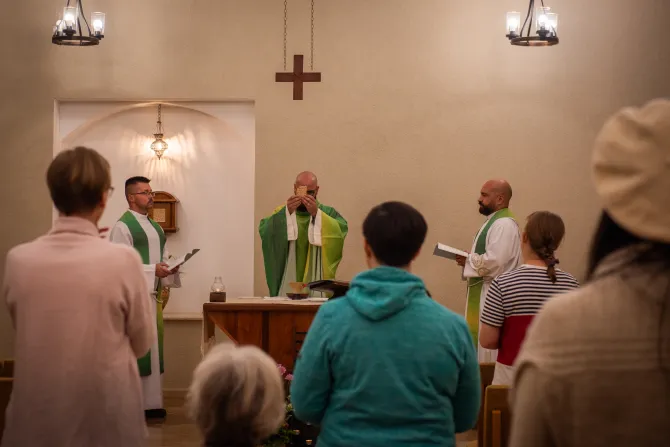Among the many expressions of the Church in the Holy Land, the Hebrew-speaking Catholic community is the smallest. It comprises about a thousand Catholic faithful living in Israel, immersed in a Hebrew cultural and linguistic environment. But despite being a vibrant and diverse part of the Christian community, it remains relatively unknown even at the local level.
The Latin Patriarchate of Jerusalem has devised a specific pastoral care plan for Hebrew-speaking Catholics through an association known as the St. James Vicariate. Eight priests are dedicated to serving in five parish communities (known as “kehilla” in Hebrew): Jerusalem, Tel Aviv-Jaffa, Haifa, Beer Sheva, and Tiberias. The vicariate also includes two communities of Russian-speaking faithful located in Haifa and Latrun.
The large majority of Catholic people in the Holy Land are Arabic-speaking — about half of them know Hebrew but are not fluent. Hebrew-speaking Catholics sometimes attend activities with Arab-speaking Catholic communities, especially young people and especially in Galilee (Tiberias, Haifa) and Tel Aviv.
Before becoming a vicariate, the Association of St. James was founded in 1955 as a Catholic association dedicated to developing Hebrew-speaking Catholic communities in the state of Israel. (St. James was the head of the early Christian community in Jerusalem at the time of the apostles.) Since 2013, the St. James Vicariate constitutes an autonomous vicariate within the Latin Patriarchate of Jerusalem.
The head of the vicariate is a Polish priest, Father Piotr Zelazko, who has been living in Israel for 15 years. CNA met him at the Church of Sts. Simeon and Anna in Jerusalem, where he lives and oversees the activities of the vicariate. In these weeks since the beginning of the Israel-Hamas war, Zelazko’s task has become even more challenging. Even before the war, Eitan was already working with the military.
“Everyone knew about my Christian faith. I chose the Christian religion and not the Jewish one in which I grew up, but I am very proud to be a soldier and to help in the war for the very existence of the Jewish people in the land of Israel.” In these weeks, he is also trying to safeguard his spiritual life.
“I pray the rosary every day and ask Mary, the queen of peace, for an overwhelming military victory over Islamic terrorism, that will hopefully bring peace. I ask my community to pray for the safety of the IDF soldiers and for peace in the Holy Land between Muslims, Christians, Jews, and Druze.” (Druze are ethnically Arabic-speaking Arabs whose religion incorporates beliefs from Islam, Judaism, and Christianity as well as ideas from Greek philosophy and Hinduism.)
Another member of the Hebrew Catholic community, “Michael,” grew up in the kehilla of Haifa. Today, he lives in France, but when the war broke out, he felt the need to return to his country. “I could not stop listening to the media, watching the television, as I knew my country was under attack. I’m a paramedic and a registered nurse. I just felt I needed to go back to Israel and help,” he told CNA. For the past few weeks, he has been volunteering at a hospital in Jerusalem that welcomes people from various backgrounds.
“As the war raged, the hospital found itself with a triple challenge: The Palestinian staff sometimes has problems entering Israel; many foreign volunteers went back to their countries; and last but not least, the general hospitals in the city needed to vacate beds and the hospital received oncological patients,” he said. Michael is currently caring for oncology patients. “I can’t help but think of the passage in the Gospel where Jesus says: ‘Truly I say to you, to the extent that you did it for one of the least of these brothers or sisters of mine, you did it for me’” (Mt 25:40).
He said they attend to all the basic needs of the patients. “We keep them clean, we help them eat and drink, we listen to them. My thought,” he told CNA, “is that many times we forget the basics — to ‘love thy neighbor.’ Only with compassionate eyes can we see the other as our neighbor, as our brother and sister, and from that understanding building a better place.” Listening and prayer are priorities for Zelazko and the priests of the St. James Vicariate. “The wounds are deep, and it will take a long time to heal them and restore mutual trust,” Zelazko said, trying to articulate the emotions stirring within the community at this time.
Many Hebrew-speaking Christians feel part of Israeli society; many are citizens of the state of Israel and are involved in the conflict in some way. “There is a battle inside us and among our people for Christian values to prevail; otherwise, it would be a victory for the terrorists,” Zelazko said. “But when you are a part of the conflict, it’s not easy; it’s not automatic.” “For this reason,” he added, “we must be careful not to judge anyone without thereby justifying wrong attitudes. Everyone has their own story, and everyone has their own timing.”
Forgiveness is the supreme point of this journey, Zelazko said. “Our faith asks us to forgive, but faith is not automatic. Perhaps it is still too soon… we cannot expect traumatized people to be immediately ready to forgive. What we do is to pray that the will for revenge and anger does not prevail in us, to preserve our humanity and not let violence darken our hearts.”
“It is impossible for man to forgive on his own — forgiveness is something divine, and we need God to forgive. We need to pray to God to give us the strength to forgive.”
By Marinella Bandini





Leave A Comment